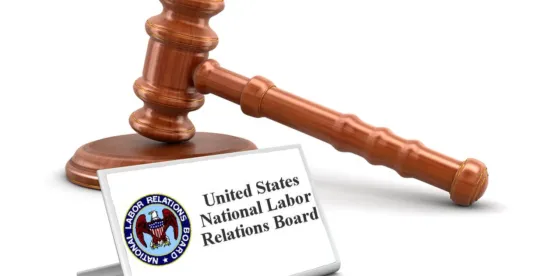Earlier this week, the National Labor Relations Board General Counsel Jennifer Abruzzo issued Memorandum GC 24-06 seeking to clarify the obligations imposed by the National Labor Relations Act (NLRA) on academic institutions to provide information to a union concerning student workers where the requested information may implicate the Family Educational Rights and Privacy Act (FERPA).
The memo outlines the process that academic institutions should follow in responding to a request for FERPA-protected information. Additionally, in accordance with her stated commitment to work collaboratively with other federal agencies and departments with overlapping jurisdiction in pursuit of shared objectives (as previously discussed here and here), General Counsel Abruzzo published an attachment to the memo—a template consent form developed by the General Counsel’s Office in conjunction with the U.S. Department of Education to help streamline the process by which academic institutions respond to a request for information that is covered under FERPA.
Background
Under the NLRA, as currently interpreted by the National Labor Relations Board (NLRB), student workers who provide services to their college or university are “employees” subject to the rights and protections of the NLRA, including the right to “form, join, or assist labor organizations” and to “bargain collectively through representatives of their own choosing.” In the exercise of these rights, an institution may have an obligation to furnish a union representing, or seeking to represent, student workers with contact information for these students as well as other information relevant and necessary to carry out its representational duties and responsibilities.
Where student workers are concerned, it is common for all or part of the requested information to fall within the ambit of the privacy protections under FERPA, which provides that institutions receiving any federal funding may not disclose “education records” or personally identifiable information contained in such records unless the student has provided prior written consent, or an exception applies.
Thus, the two federal statutes, and the obligations they impose on academic institutions, appear to be in tension with one another, with academic institutions caught in the middle. As General Counsel Abruzzo stated in her memo, she is actively prosecuting “several cases” involving this tension where she is seeking a Board order requiring the academic institution to obtain the necessary FERPA disclosure consents, furnish the requested information for student workers who provide consent, and to furnish de-identified information for those who decline consent, if possible.
Information Request Process Under NLRA and FERPA
GC Memo 24-06 outlines the steps that academic institutions must take to comply with their bargaining obligations under the NLRA and their obligations under FERPA when presented with an information request that implicates FERPA.
First, the institution must determine whether the information request seeks information protected under FERPA—i.e., educational records or personally identifiable information. Under FERPA regulations, records concerning a student-employee “who is employed as a result of his or her status as a student are education records.” Thus, General Counsel Abruzzo advises that institutions first establish whether the student workers at issue in the information request are employed as a result of their status as students. According to the memo, where an institution determines that all or some of the requested information is covered by FERPA, it should be prepared “to explain why and substantiate with documentary evidence, if available, that the student-employee is employed as a result of their status as a student to the union and, if necessary, before the NLRB.” The memo further states that the institution must make this showing for each job classification encompassed by the information request.
Second, after determining that that a union’s request for information implicates FERPA, the institution must offer a reasonable accommodation and bargain in good faith with the union. General Counsel Abruzzo suggested that institutions and unions bargain over the process for obtaining the written consent required under FERPA, but emphasized that it would be unreasonable, and therefore a violation of an institution’s duty to bargain, to propose that the union seek any necessary FERPA consents where the union does not possess the identities or contact information for the student workers at issue.
Lastly, the process outlined in the memo calls for the academic institution and union to reach an agreement over an accommodation for the requested information and abide by it. Alternatively, if no agreement is reached, the union may file an unfair labor practice charge and the Board will designate a proper accommodation in light of the bargaining proposals put forward during step 2.
It is worth noting that, under FERPA, there is an exception for “records sought pursuant to a lawfully issued subpoena.” Thus, the union could obtain FERPA-covered information vis a vis a subpoena issued by the NLRB. However, General Counsel Abruzzo indicated that she does not plan to issue subpoenas in FERPA cases because, in her opinion, it would be counter to the Board’s mandate to promote good faith bargaining as well as administratively burdensome.
Template FERPA Consent Form
Recognizing the frequency with which information requests in this industry require “accommodative bargaining” due to FERPA, the General Counsel’s memo seeks to help streamline the process through a template consent form for the disclosure of FERPA-covered information to unions.
The template consent form permits the institution to disclose the student worker’s “employment-related education records” that are “relevant to and reasonably necessary for union representation proceedings (i.e., union elections), unfair labor practice proceedings, organizing student-employees, and/or the performance of a union’s representative functions.” The scope of the consent extends beyond the student worker’s enrollment in the institution, permitting the institution to disclose the student’s records to a union both during and after a student’s attendance at the institution unless and until the student provides a written revocation of their consent. Further, the template consent form permits the union to redisclose the student worker’s records to third parties. While this redisclosure provision seems geared toward judicial, administrative, and arbitral proceedings, it is written broadly enough to allow redisclosure to any third party deemed “reasonably necessary” by the union.
As stated in the memo, General Counsel Abruzzo proposed that institutes could provide the template consent form to students during the on-boarding process for their position – even before they are represented by a union. Alternatively, if the institution does not want to incorporate, on its own initiative, the FERPA consent form into the onboarding process, the institution can bargain with the union over a process for obtaining consent once the union is recognized or certified. The memo encourages institutions and unions to come to an agreement on the consent issue before the need arises—i.e., before a request for information covered by FERPA is made—so as to reduce delay and eliminate the need to seek student consent at the time the union needs the information.
Takeaways
This latest memo from the General Counsel seeks to address the tension between the NLRA and FERPA. While the memo recognizes that this tension does exist – and, implicitly, that institutions have a legitimate confidential interest in complying with FERPA – the memo proposes addressing this tension by promoting a broad waiver of the privacy protections enshrined in FERPA. The template consent form is broadly written—encompassing a wide range of information, permitting the disclosure of protected information to third parties, and allowing for the disclosure of information pertaining to individuals who may no longer be enrolled in the institution. Institutions who reject the General Counsel’s guidance must then satisfy the burden of proving that the requested information is covered under FERPA and comply with the arduous “accommodative bargaining” process outlined in the memo. Even then, the NLRB, absent an agreement between the parties, may ultimately require institutions to furnish the requested information despite the privacy concerns and confidentiality interests at stake. Academic institutions should consult with counsel before responding to a request for information pertaining to student workers. As always, we will be monitoring developments in this area and report back here.






 />i
/>i

